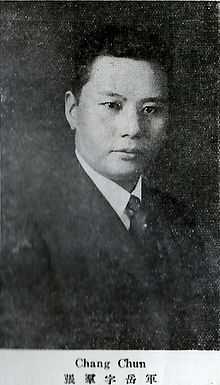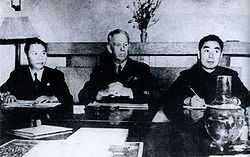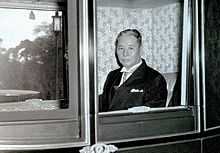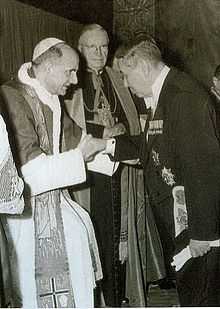Zhang Qun
| Zhang Qun (Chang Chun) 張群 | |
|---|---|
 | |
| In 1929, when mayor of Shanghai | |
| Secretary General to the President | |
| In office 18 May 1954 – 29 May 1972 | |
| Premier of the Republic of China | |
| In office 23 April 1947 – 28 May 1948 | |
| President | Chiang Kai-shek |
| Preceded by | Chiang Kai-shek |
| Succeeded by | Weng Wenhao |
| Governor of Sichuan Province | |
| In office 15 November 1940 – 14 May 1947 | |
| Vice Premier of the Republic of China | |
| In office 1 January 1938 – 11 December 1939 | |
| President | Lin Sen |
| Premier | H. H. Kung |
| Preceded by | H. H. Kung |
| Succeeded by | H. H. Kung |
| Foreign Minister of the Republic of China | |
| In office 12 December 1935 – 4 March 1937 | |
| Preceded by | Wang Jingwei |
| Succeeded by | Wang Ch'ung-hui |
| Governor of Hubei Province | |
| In office 7 July 1933 – 17 December 1935 | |
| Mayor of Shanghai | |
| In office 1 April 1929 – 6 January 1932 | |
| Personal details | |
| Born | 9 May 1889 Huayang District, Sichuan, Qing Empire |
| Died | 14 December 1990 (aged 101) Taipei, Taiwan |
| Nationality | |
| Political party | |
| Alma mater | Baoding Military Academy |
Zhang Qun or Chang Chun (Chinese: 張群; pinyin: Zhāng Qún; also known as Zhang Yuejun 張岳軍; May 9, 1889 – December 14, 1990) was premier of the Republic of China and a prominent member of the Kuomintang. He served as secretary general to the President of the Republic from 1954 to 1972 and senior advisor to Presidents Chiang Kai-shek, Yen Chia-kan, Chiang Ching-kuo, and Lee Teng-hui.
Biography
Born in the Huayang County (now part of Shuangliu County), Sichuan province, Chang was admitted in 1906 to the national military academy in Paoting in north China. The next year, he was selected to go to Japan to study at the Shimbu Gakko, a military school. Together with his classmate, Chiang Kai-shek, he joined the T'ung-meng-hui the same year. After completing their preparatory studies, they both served in the Takada regiment of the Niigata army before returning to China to serve under Sun Yat-sen in the revolution which would overthrow the Qing monarchy in 1911. During this period, a lifelong friendship between the two men and Huang Fu was formed and the three became sworn, or blood, brothers. Chang married Ma Yu-ying (馬育英) in 1913; because their first child was born in 1917, he later claimed to have practiced family planning long before it became popular!
When Yuan Shikai attempted to restore the monarchy, Chang fled to Japan and finished his military training in 1915. Then, after a period in the Netherlands East Indies where he taught in an overseas Chinese school, he returned to China to participate in Yuan's overthrow. With the restoration of the Republic, Chang held several posts. Becoming a major general at age 28, he later became a member of the Kuomintang's Central Executive Committee, mayor of Shanghai and president of Tongji University, governor of Hubei province and foreign minister. In the KMT, he led the Political Science Clique (政學系), which included military men such as Huang Fu and Xiong Shihui (熊式輝), intellectuals, like Yang Yongtai (楊永泰) and Wang Chonghui (王寵惠), and bankers and industrialists, including Wu Dingchang (吳鼎昌) and Zhang Jiaoao (張嘉璈). During World War II, he served as secretary general of the National Security Council and governor of Sichuan province.

In 1946, Chang, representing the national government, was a member of the Committee of Three along with General George C. Marshall, then head of the U.S. Joint Chiefs of Staff, and Chinese Communist Party representative Zhou Enlai, which had been established in Nanjing in January, 1946 to effect a Kuomintang-Chinese Communist Party truce and head off civil war. The Marshall Mission helped to bring about a temporary cease-fire and but its plans for a political-military settlement did not succeed.
In 1947, Chang headed the first coalition government as president of the Executive Yuan, a position also known as premier of the Republic of China.[1]

His platform was to prepare China for constitutional government, land reform and price control. After the transfer of the capital from Nanking to Taipei, he became chief of staff and secretary general to the president in 1954. Among his duties were planning the government's foreign policy and representing the president in Japan, Africa and Europe, including the Second Vatican Council in 1965.

In 1972, he played a large role in the difficult negotiations regarding Japan's switch of diplomatic recognition to the People's Republic of China. His last official position was chairman of the Presidium of the Kuomintang's Central Advisory Committee.[2]
A member of the board of the National Palace Museum, Chang was a renowned calligrapher, keen art collector, friend of great artists such as Chang Dai-chien, Huang Jun-bi and Lan Yin-ting, and recipient of honorary doctorates from several universities, including the University of Illinois, Seoul National University, St. John's University (New York), Sungkyunkwan University and Soochow University (Taiwan). He died at the age of 101, of heart and kidney failure, at Veterans General Hospital in Taipei, on December 14, 1990.[3]

Chang's wife, Ma Yu-ying (馬育英; pinyin: Ma Yuying), died in 1974 as well as his daughter, Mrs. Yalan Chang Lew (劉張亞蘭; pinyin: Liu Zhang Yalan), widow of Ambassador Yu-Tang Daniel Lew (劉毓棠; pinyin: Liu Yutang), who died on July 14, 2014 at age 97 in Seattle, WA. He is survived by his sons Dr. Philip Chi-cheng Chang (張繼正; pinyin: Zhang Jizheng), former communications minister 1969-72, chairman of the Council for Economic Planning and Development 1973-76, finance minister 1978-81 and governor of the Central Bank of China 1984-89, and Dr. Theodore Chi-chong Chang (張繼忠; pinyin: Zhang Jizhong), vice president of the Truth Theological Seminary and pastor emeritus of the Mandarin Baptist Church of Pasadena, California.
Internet Video
- Governor Chang takes salute at a parade of Central Military Academy cadets, marking the 31st anniversary of the Chinese Revolution in 1942
- 行政院長張群蒞台 Premier Chang arrives in Taipei in October, 1947
- 台灣省慶祝第二屆光復節大會 Premier Chang presides over the celebrations of Taiwan's Retrocession Day, October 25, 1947
- 張群特使訪日專輯 Special Envoy Chang Chun visits Japan, where he met with the Emperor, Prime Minister Nobusuke Kishi and others in 1957
- 日本前首相吉田茂訪華 Secretary General Chang receives former Japanese Prime Minister Yoshida in 1964
- 長江萬里圖 The 65-foot long painting, Yangtze River by Chang Dai-chien, commissioned for Chang Chun's 80th birthday, on display at the National History Museum in Taipei in 1967
- 行政院新舊任院長交接典禮 Secretary General Chang presides over the transfer of the premiership in 1972
- Chang Hsueh-liang's 90th birthday celebration, hosted by 101-year-old Chang Chun on June 1, 1990 on YouTube
External links
| Wikimedia Commons has media related to Chang Chun. |
- Photo of Chang Chun (left) with Chiang Kai-shek as cadets in Japan, 1910
- Photo taken in 1945: US Ambassador Patrick J. Hurley, Chiang Ching-kuo (蔣經國), President Chiang Kai-shek, Chang Chun, Foreign Minister Wang Shijie (王世杰) and Mao Zedong (毛澤東) from left to right
- Article on the Chang residence in Shanghai by Michelle Qiao, Shanghai Daily Home
- Photo of Premier Chang arriving at the National Assembly's first meeting in 1948
- Chang Chun examining Yangtze River, the 65-foot long painting by Zhang Daqian, commissioned for his 80th birthday
- Photo taken in 1978 of the Three Changs: Chang Chun (right) with General Chang Hsueh-liang (left) and painter Chang Dai-chien (center)
- Photo of 100-year-old Chang Chun in 1989, after being honored by President Chiang Ching-kuo with the Order of Chung Cheng
- Photo of 101-year-old Chang Chun with Chang Hsueh-liang in 1990
- Photographic article on the Chang Residence in Shihlin, designed by Wang Dahong 王大閎, who was architect of several major public buildings, including the National Sun Yat-sen Memorial Hall (Taipei) 國立國父紀念館. The article was written in 2006, 16 years after the residence was abandoned. On April 7, 2014, the residence was declared a cultural heritage site by the Taipei City Department of Cultural Affairs.
References
- ↑ China: Hao Hao, Time Magazine on Chang's appointment as premier, April 28, 1947
- ↑ Biographical Dictionary of Republican China, Volume 1: Ai-Ch'u. Howard L. Boorman, Editor; Richard C. Howard, Associate Editor. New York: Columbia University Press, 1966, pp. 47-52
- ↑ Chang Chun Is Dead; Taiwan Aide Was 101, The New York Times, December 16, 1990
| Political offices | ||
|---|---|---|
| Preceded by Chiang Kai-shek |
Premier of the Republic of China 1947–1948 |
Succeeded by Wong Wen-hao |
| |||||||||||||||||||||||||||||||||
| |||||||||||||
|
